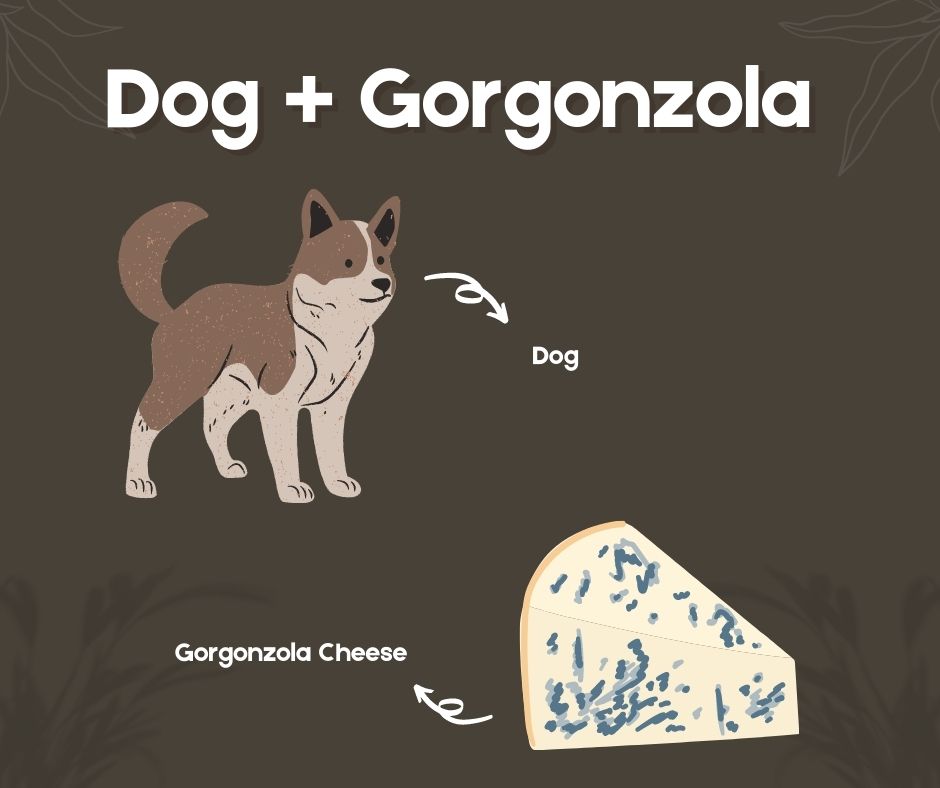Last Updated on November 5, 2022 by Aaron
Should you let your dogs eat gorgonzola or other blue cheeses? What about only a small amount? Will they get sick from it?
The answer is – No, you’re risking their health. While you might feeling okay to feed them a small amount and everything looks fine after, it’s better not to feed your furry friends with gorgonzola or any other blue cheeses, including the roquefort, stilton, cambozola, Bleu de Gex, Danish blue cheese, and dolcelatte.
Table of Contents
The main reason for that is because the beautiful blue-veined marble in the gorgonzola cheese is actually the blooming of mold penicillium roqueforti. The mold may pose no harm to human, studies (1, 2) had suggested that the mold produces a substance called roquefortine C, a mycotoxins, which can cause poisoning in dogs.
The symptoms are:
- Vomiting
- Diarrhea
- Panting
- Muscle tremors
- Paddling
- Hyperesthesia
- Seizures
Out of 6 intoxicated dogs, 2 dogs vomited and 2 dogs died according to the study.
High Fat and Salt in Gorgonzola for Dogs
Gorgonzola, like other cheeses, is rich in calcium and protein but also high in fat and quite salty. It contains a considerable amount of saturated fat, which also known as “bad cholesterol”. A single slice of 1 ounce gorgonzola is providing for about 10% daily need of fat and 25% of saturated fat for human, and that’s equivalent to 2-3x more for dog’s recommendation of fat intake. It can lead to pancreatitis, arteries clogging, and other health issues in dogs.
While you can’t feed them gorgonzola, you can definitely feed them this cheese chews.
Lactose in Gorgonzola lead to Lactose Intolerance in Dogs
Dogs are just like us human, they may develop lactose intolerance when they get older as well. Due to not producing enough lactase in their body, they maybe okay to digest small quantities of lactose in gorgonzola.
Gorgonzola is considered low in lactose, low FODMAP, and generally good for weak gastrointestinal. But dog’s stomach is quite sensitive, and may not tolerant as much lactose as we do. So if you feed them cheeses like gorgonzola, these are the signs you should keep an eye on:
- Gas and bloating
- Loose stools
- Diarrhea
- Vomiting
- Thirst
- Weakness
What about Cats then?
Do your cats love milk and cheese? If yes, you are the lucky one. Many adult cats are lactose intolerant to an extent, and you should always feed them dairies wisely. But when it comes to gorgonzola or other blue cheese, It’s certainly not recommended, not just because of lactose intolerance, but cats by nature is much more sensitive to food than dogs. So the adverse reactions might even be worse in cats than dogs.
Dogs Allergic to the Milk Source in Gorgonzola
Milk or dairy allergy is a rare condition where dogs are showing excessive skin irritation, itchiness and licking their paws or anus. The milk allergy happened when the body immune system attacks the milk protein as invasive substance, which triggered an inflammatory response.
Gorgonzola is made from unskimmed cow’s milk. If your dogs happened to react to dairies, do not feed them gorgonzola.
Pay extra attention to the milk source too. Some dogs will react to goat’s and sheep’s cheese but not the cow’s milk cheese.
For that, here I discussed a few good dairy-free cheese substitutes, where your canine companion can enjoy too!
What cheese is OK for dog?
Although gorgonzola and blue cheeses are not recommended, you can still offering your dogs a small chunk of these cheeses occasionally as treat for training or reward:
- Cottage cheese
- Feta
- Cheddar
- Parmesan
- Mozzarella
- Gouda
- Swiss cheese
- Jack
- Asiago
- Fontina
- Pecorino Romano
- Camembert
- Emmental cheese
Make sure your dogs aren’t VERY lactose intolerance to being with.

